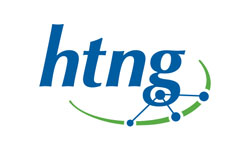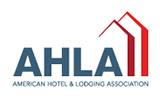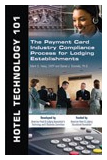
Member Login |
Credit Card Security is a Major Issue - Hotel Associations Issue Joint Statement on Data Protection
publication date: Jun 11, 2013
|
author/source: Hotel Technology - Next Generation (HTNG)
Hotel Associations Issue Joint Statement on Credit Card Security Urges Hotel Managers to Take Immediate Action WASHINGTON, CHICAGO, and AUSTIN | Three major hotel industry associations, including the American Hotel & Lodging Association (AH&LA), Hotel Technology Next Generation (HTNG), and Hospitality Financial and Technology Professionals (HFTP) today issued the following joint statement to hotels regarding organized cyber crime attacks on credit card data. It identifies actions that hotels -- and not their system vendors -- need to take immediately in order to minimize their vulnerabilities and to avoid the potential for hundreds of thousands of dollars in costs and fines that typically result when just a single hotel system is breached. The three associations play pivotal roles in educating hoteliers and hotel IT professionals on critical issues, and in analyzing and addressing them, and represent critical constituencies of General Managers, Controllers, and IT executives at brands, management companies, and hotels. "Our decision to address this jointly is directly related to the magnitude of the threat," said Joe McInerney, CEO of AH&LA. "We don't want to dilute the message by saying different things; we all agree on the key steps hotels need to take," said Frank I. Wolfe, CAE, CEO of HFTP. "Credit card crime is the top issue for hotel company chief information officers (CIOs) today, but they can't address it effectively without the help of every General Manager and Controller," said Douglas Rice, CEO of HTNG. This alert is not intended in any way to suggest that hotels should not adhere to the Payment Card Industry Data Security Standards (PCI-DSS), which is the best way to avoid being breached. But these standards are complex and often misunderstood, and take time and money to implement. Hotels that have not yet started their PCI compliance can use this information to help focus their initial efforts. Those who think that they don't need to do anything about PCI because their vendor provides a PCI compliant system will learn that this is not possible, and that there are key actions they still need to manage themselves. STATEMENT ON CREDIT CARD SECURITY Cyber criminals are systematically attacking systems that store credit card data, including Point-of-Sale and Property Management Systems. The criminal organizations are highly structured and integrated with the world's organized crime rings. Detailed forensic analysis by law enforcement agencies and specialized private-sector security practices, as well as by security departments at major hotel groups around the world, leave little doubt that the attacks on hotels are highly targeted and effective. Many hoteliers believe they are not vulnerable because they use Point-of-Sale and Property Management Systems that have been validated as conforming to the latest PCI security standards. Unfortunately this is far from the case. Even such validated systems can be vulnerable if the hotel operates them in an unsecured manner. Leading forensics firms agree that the most important security measures are those that keep cyber criminals from getting inside the hotel network in the first place. Once inside, there are many ways for them to steal the data, even if the PMS or POS system itself is secure. In most cases, the hotel, not the vendor, is responsible for preventing unauthorized people from gaining access to their system. This is the hole that is most frequently exploited by the criminals. Even when a national hotel brand or management company provides network security for the hotel, the local property remains in control of important elements. We urge every General Manager and every Controller to understand that there are three specific actions that they -- not their vendors -- must take in order to reduce their hotel's vulnerability to credit card theft. These actions alone will not guarantee your hotel will not be breached. They may not stop a breach that is already in progress. But according to the Verizon Business/US Secret Service report from 2010, 96 percent of breaches would have been stopped had these measures been in place. Many brands and management companies do not perform these functions for hotels. Those that do, generally do not (often cannot) do them all. Your corporate IT department should be able to tell you, very specifically, which things they have done; you will need to address the others. The three actions are:
Additional Resources AH&LA has created a primer, Payment Card Industry Compliance Process for Lodging Establishments, which helps demystify PCI compliance and explain it in terms that make sense for hoteliers. This quick reference tool is a great starting point and helps hoteliers quickly get up to speed via check lists, planning guides, and links to additional resources. The cost is $10 for AH&LA members and $20 for nonmembers and may be purchased via the Educational Institute. Members may download a copy via the American Hotel & Lodging Educational Foundation Website. ******  About American Hotel & Lodging Association About American Hotel & Lodging Association Serving the hospitality industry for a century, AH&LA is the sole national association representing all sectors and stakeholders in the lodging industry, including individual hotel property members, hotel companies, student and faculty members, and industry suppliers. Headquartered in Washington, D.C., AH&LA provides members with national advocacy on Capitol Hill, public relations and image management, education, research and information, and other value-added services to provide bottom-line savings and ensure a positive business climate for the lodging industry. Partner state associations provide local representation and additional cost-saving benefits to members.  About Hospitality Financial & Technology Professionals HFTP, Austin, Texas, USA and Maastricht, The Netherlands, founded in 1952, is the global professional association for financial and technology personnel working in hotels, clubs and other hospitality-related businesses. HFTP provides first class educational opportunities, research, and publications to members around the globe including, the premiere hospitality technology conference HITEC - founded in 1972. HFTP also awards the only hospitality specific certifications for accounting and technology - the Certified Hospitality Accountant Executive (CHAE) and the Certified Hospitality Technology Professional (CHTP) designations. HFTP was founded in the USA as the National Association of Hotel Accountants.  About Hotel Technology Next Generation The premier technology solutions association in the hospitality industry, Chicago-based HTNG is a self-funded, non-profit trade organization with members from hotel and hospitality companies, technology vendors to hospitality, and other industry members including consultants, media, and academic experts. HTNG's members participate in focused workgroups to bring to market open solution sets addressing specific business problems. HTNG fosters the selection and adoption of existing open standards. Where necessary, it also develops new open standards to meet the needs of the global hospitality industry. Membership in HTNG is open to hotel and hospitality companies, technology vendors to hospitality, consultants, academics, press and others. Currently more than 400 corporate and individual members from across this spectrum, including most of the world's leading hotel companies and technology vendors, are active HTNG participants.RELATED BOOK
ORGANIZATION www.htng.org 650 E Algonquin Rd Ste 207 USA - Schaumburg, IL 60173 Phone: +1 847 303 5560 |
Search the SiteEducator Profiles |
